Wipf & Stock Studies in Pentecostalism Upgrade (5 vols.)
Digital Logos Edition
Overview
Explore Pentecostal tradition and modern thought with the Wipf & Stock Studies in Pentecostalism Upgrade. From the growing influence of African Pentecostalism to the Pentecostal / Charismatic response to suffering, this collection offers insight into the legacy of Pentecostal belief and tradition and how it’s lived out in today’s world. Learn about the tradition’s history of pacifism and what it means now, examine scholarly narratives in areas of Pentecostal research, and gain a deeper understanding of the church’s role in unifying Christianity in the past, present, and future.
In the Logos editions, these volumes are enhanced by amazing functionality. Scripture citations link directly to English translations, and important terms link to dictionaries, encyclopedias, and a wealth of other resources in your digital library. Perform powerful searches to find exactly what you’re looking for. Take the discussion with you using tablet and mobile apps. With Logos Bible Software, the most efficient and comprehensive research tools are in one place, so you get the most out of your study.
This collection is no longer available for purchase.
Key Features
- Examines Pentecostal tradition in light of modern issues
- Addresses areas of scholarly research from a Pentecostal perspective
- Offers insight into historical and modern approaches to topics such as suffering, Christian unity, war, and mission
Product Details
- Title: Wipf & Stock Studies in Pentecostalism Upgrade
- Publisher: Wipf & Stock
- Volumes: 5
- Pages: 1,132
- Christian Group: Pentecostal / Charismatic
- Resource Type: Topical
- Topic: Theology
Individual Titles
- Pentecostal Theology in Africa by Clifton R. Clarke
- Pentecostal and Holiness Statements on War and Peace by Jay Beaman and Brian K. Pipkin
- Journal of Biblical and Pneumatological Research by Paul Elbert
- Pentecost and Parousia by Peter Hocken
- A Dramatic Pentecostal / Charismatic Anti-Theodicy by Stephen C. Torr
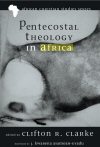
This collection of essays explores the theology of African Pentecostalism from various vantage points. Rather than approaching African Pentecostalism in a systematic fashion, Clifton R. Clarke aims to explain the theological implications of African Pentecostal practices and beliefs. The book is divided into two sections: the first deals with theological issues, and the second with the more practical ramifications. Clarke hopes to make a contribution toward opening up more theological discourse in the study of African Pentecostalism.
This is a distinctive book for people who are intellectually curious about African Pentecostal theology. It provides thick descriptions of the major themes, motifs, moral visions, and trends of African Pentecostal Christianity.
—Nimi Wariboko, Katherine B. Stuart Professor of Christian Ethics, Andover Newton Theological School
The Christian community is witnessing a tremendous growth of Christianity in Africa, a continent which was once a mission field. This book is an attempt to throw more light on African Pentecostalism, which is the climax of the Christian growth in Africa. It is a very good tool for scholars who want to increase their knowledge and understanding of African Pentecostalism.
—Opoku Onyinah, chairman, Church of Pentecost
The spread of Pentecostalism has become a global phenomenon. Despite some similarities in the Pentecostal Christian community, there are peculiar theologies from one continent to another. This book informs readers about some key theological topics, the mode of formulating theologies, and the undercurrent forces that influence the formulation and articulation of Pentecostal theology in Africa. The book is a door to Pentecostalism in Africa and a step to understanding African Christianity.
—Thomas A. Oduro, president, Good News Theological College and Seminary, Accra, Ghana
Clifton R. Clarke is an associate professor of global missions and world Christianity at Regent University School of Divinity. He is the author of African Christology: Jesus in Post Missionary African Christianity.
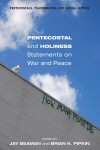
Many Pentecostal groups have forgotten their legacy of war resistance and their doctrinal history opposing killing. To rectify this loss, Jay Beaman and Brian K. Pipkin have cataloged Holiness and Pentecostal denominational statements on war and peace. This antiwar collection offers a picture of the early Pentecostal movement as pacifist. While their early doctrines opposed killing, many named in this book are now widely considered to be stalwarts of the Religious Right, or at least staunch supporters of Christian participation in war. Beaman and Pipkin’s goal is to frame the official position of early Pentecostals on war and peace, and encourage Pentecostals today to reflect on their antiwar heritage.
In this remarkable book Jay Beaman and Brian Pipkin demonstrate that the rejection of war was central to many early Holiness and Pentecostal Christians. This book will challenge the complacency of many of their heirs and remind us that nonviolence is the common heritage of many so-called evangelicals in the United States and around the world.
—William Kostlevy, associate professor of history and political science, Tabor College
Reading this book will remind Pentecostals of their spiritual ancestors and what they did in favor of peace and justice, and it will remind non-Pentecostals that the stereotypes of ‘social strike’ and ‘refuge of the masses’ do not always adequately describe the life and mission of all Pentecostal believers and churches around the world.
—Darío López Rodríguez, Gamaliel Biblical Seminary of the Church of God
Being a conscientious objector to war and violence doesn’t mean you are part of a unique community or an exclusive club, and CO is not simply the domain of the historic peace churches. Politics and other earthly pressures aside, being a CO to war and violence is what it means to be human. Thanks to Jay and Brian for this poignant reminder.
—Maria Santelli, Center on Conscience & War
Jay Beaman is a sociologist and administrative faculty member doing research at Warner Pacific College in Portland, Oregon. He is the author of Pentecostal Pacifism.
Brian K. Pipkin is assistant managing editor of Pax Pneuma: The Journal of Pentecostals and Charismatics for Peace and Justice. He is the author of “The Foursquare Church and Pacifism” in Pentecostals and Nonviolence.
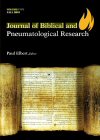
The Journal of Biblical and Pneumatological Research (JBPR) is an international peer-reviewed academic serial dedicated to narrative- and rhetoric-minded exegesis of biblical and related texts. JBPR’s aim is to stimulate new thematic and narrative-critical exploration and discovery in both traditional and under-explored areas of research. This volume is edited by Paul Elbert.
- “The Rebirth of Prophecy: Trajectories from Moses to Jesus and His Followers,” by Roger Stronstad
- “‘Emotional’ Temptation and Jesus’ Spiritual Victory at Markan Gethsemane,” by Richard Hicks
- “Reweaving the Texture of Luke 16:14–18,” by Bart B. Bruehler
- “If This Man Were a Prophet He Would Have Known . . . (Luke 7:39),” by Lyle Story
- “Who Searches Hearts and What Does He Know in Romans 8:27?” by Kenneth Berding
- “The Relationship between the Glory of YHWH and the Spirit of YHWH in the Book of Ezekiel—Part One,” by Pieter De Vries
- “Review of John Christopher Thomas, The Apocalypse: A Literary and Theological Commentary,” by Daniel F. Stramara Jr
- “Review of James A. Kelhoffer, Persecution, Persuasion and Power: Readiness to Withstand Hardship as a Corroboration of Legitimacy in the New Testament,” by Jeffrey Brickle
- “Review of Kathleen M. Rochester, Prophetic Ministry in Jeremiah and Ezekiel,” by Pieter De Vries
Paul Elbert teaches theology and science at the Pentecostal Theological Seminary in Cleveland, Tennessee. He is co-chair of the Formation of Luke-Acts section in the Society of Biblical Literature, and he’s a research advisor to the Dominican Biblical Institute in Limerick, Ireland. His writings have appeared in Zeitschrift für die neutestamentliche Wissenschaft and Catholic Biblical Quarterly. He also served as editor of Essays on Apostolic Themes and Faces of Renewal.
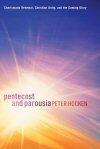
In this volume, Peter Hocken argues that the charismatic movement’s grace for unity can be seen in how the movement began and spread. Its deep orientation to unity finds its foundation in the end-times significance of baptism in the Spirit poured out on Christians from so many traditions that reinforces the “one hope” for the coming of the Lord. Many developments from the last 20 years indicate that the time is now ripe for an ecumenism of the Spirit within which the charismatic impulses of the Holy Spirit can purify and deepen the wider movement for Christian unity. Growing reconciliation between Evangelicals and Catholics suddenly seems less utopian as Pope Francis shows the servant face of a humbler Catholic Church.
The title, Pentecost and Parousia, makes clear that Peter Hocken does not see the ecumenical movement as being just about our efforts to bring about doctrinal agreement or institutional change. Rather it is a matter of recognizing and being faithful to the grace that has been given and looking forward together to the fulfillment of God’s purposes. This is a perspective with which we need to engage.
—Kevin McDonald, archbishop, Catholic Bishops’ Conference of England and Wales
The Church lives a new time. The arrival of Francis, his gestures and actions, are a breath of the spirit. This book by Peter Hocken is prophetic because it was written before the election of the new pope. The unity of the church will be the work of the Holy Spirit, and Pentecost and Parousia bears witness to this.
—Norberto Saracco, rector, FIET (International Foundation of Theological Schools)
Peter Hocken, drawing on his theological, pastoral, and practical experience, considers the effects of the Pentecostal-charismatic outpouring of the spirit on Christian unity and on the ecclesiology and witness of the whole church. He combines an analytical with a prophetic approach, acknowledging important events in recent church history but recognizing that the work for unity is a spiritual battle leading to a full ecumenism of the spirit as we await the Lord’s return. Highly recommended.
—Charles Whitehead, former president, International Catholic Charismatic Renewal
Peter Hocken is a Catholic priest from England living in Austria. A former executive secretary of the Society for Pentecostal Studies, he is author of several books, including The Challenges of the Pentecostal, Charismatic and Messianic Jewish Movements.
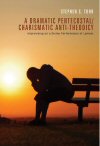
This study, drawing on Kevin Vanhoozer’s “dramatic” approach to theology, argues that the way God calls us to “perform” as we seek to communicate with him amidst such situations is to lament, and to do so with the aid of the Holy Spirit. Rather than offering such an approach purely in opposition to the more “triumphalistic” responses common in Pentecostal / Charismatic theology and practice, this book seeks to show how a performance of lament is conducive to such theology and practice while acting as a much-needed corrective to certain aspects of it. What is provided here is therefore relevant reading for both scholars and pastors alike, particularly of the Pentecostal / Charismatic church tradition, who grapple with the realities of suffering and the questions such realities produce.
Torr’s study arises from his own experience of grief in seemingly unanswered prayer. He convincingly proposes the biblical performance of lamenting with the aid of the Spirit while waiting for eschatological relief. I commend this book warmly to all those seeking answers to the real challenges of suffering and pain.
—Allan Heaton Anderson, professor of mission and Pentecostal studies, University of Birmingham
Stephen Torr has written a rich, thoughtful, and critical exposition on the reality of suffering in the vista of faith. . . . This will be an important study for those in Pentecostal traditions; beyond that it merits the close attention of the wider community of faith as a contribution to our thinking about the problem of evil in the context of actual church practice.
—Walter Brueggemann, professor emeritus, Columbia Theological Seminary
Stephen Torr has provided an insightful account of how those working from within the Pentecostal and charismatic traditions might approach the problem of evil and suffering. His position, especially his advocacy of the genre of lament within a theo-dramatic approach, deserves to be widely read. It makes an original contribution to theological scholarship and assists the church in its pastoral practice.
—Mark J. Cartledge, director of the Centre for Pentecostal & Charismatic Studies, University of Birmingham
Stephen C. Torr is assistant curate in the Abbots Bromley Benefice, England. Having completed undergraduate studies at the University of Birmingham, he completed a PhD in theology as part of the Centre for Pentecostal and Charismatic Studies, also at the University of Birmingham. Torr trained for ordination at Ridley Hall, Cambridge.